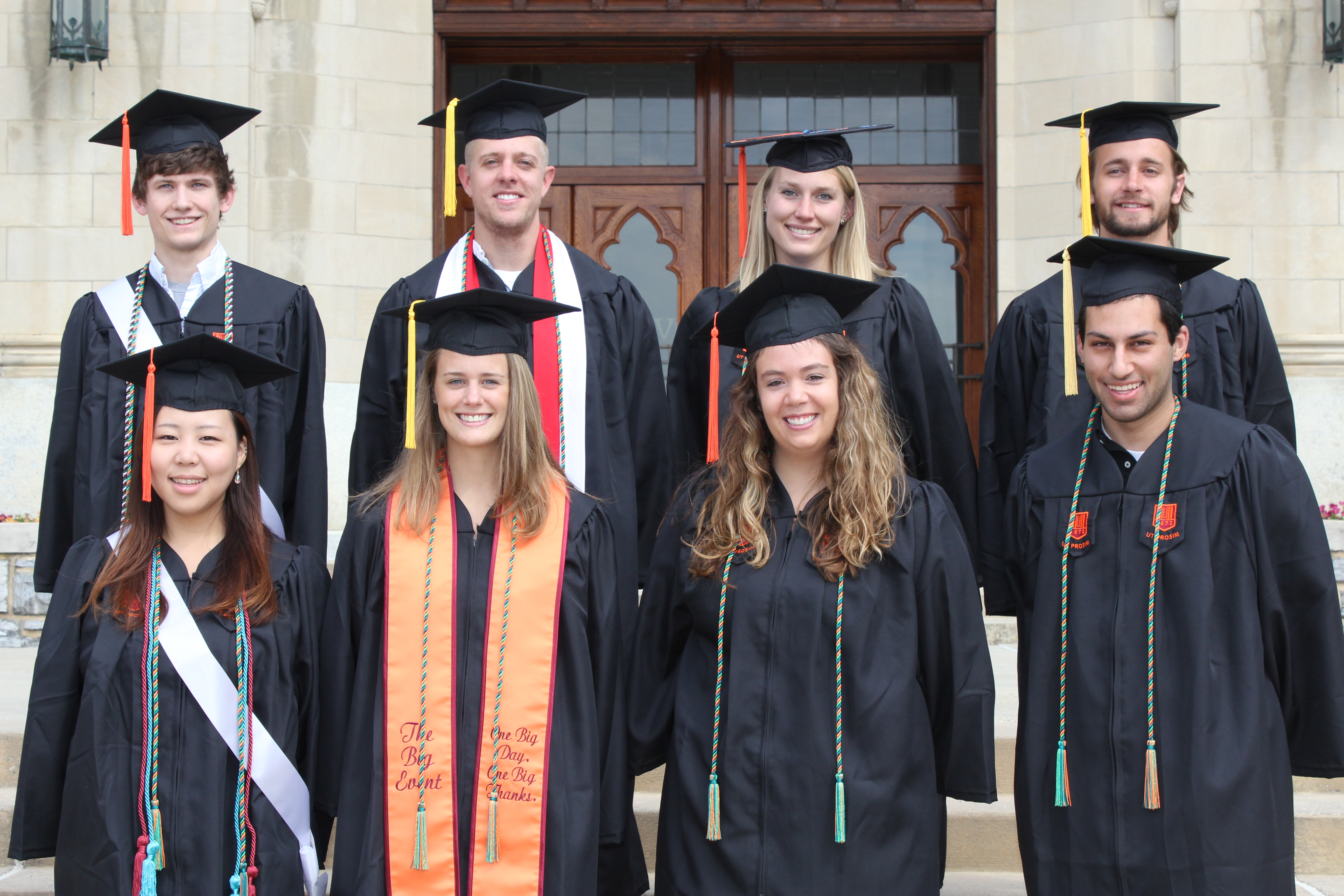The HHMI-funded Scieneering program celebrates its first set of graduates

Among the 5,000 of students set to graduate from Virginia Tech on Friday, May 17 are 14 students who are the first to complete the university's Scieneering program.
The Scieneering program is offered through the Division of Undergraduate Education and is funded by a prestigious Howard Hughes Medical Institute Science Education Grant that was awarded in 2010. Through a combination of course work and research experiences, students are exposed to interdisciplinary work combining science, engineering, and law.
The programs graduates include
- Bryce Allen of Virginia Beach, Va., a senior majoring in biology in the College of Science. His faculty mentor in the program was Konark Mukherjee, assistant professor at the Virginia Tech Carilion Research Institute.
- Winston Becker of Advance, N.C., a senior majoring in engineering science and mechanics in the College of Engineering. His faculty mentor in the program was Rich Gandour, professor of chemistry.
- Alex Callo of Clifton, Va., a senior majoring in biology and biochemistry in the College of Science. His faculty mentor in the program was Yong Woo Lee, associate professor of biomedical sciences and pathobiology at the Virginia-Maryland Regional College of Veterinary Medicine.
- Meghan Canter of Forest, Va., a senior majoring in biological sciences in the College of Science. Her faculty mentors in the program were Birgit Scharf, assistant professor of biological sciences, and Bahareh Behkam, assistant professor of mechanical engineering.
- Paul Caron, a senior double major in biological sciences in the College of Science and Spanish in the College of Liberal Arts and Human Sciences. His faculty mentor in the program was Rafael Davalos, associate professor in biomedical engineering.
- Kyle Harring of Fredericksburg, Va., a senior majoring in biological sciences in the College of Science. His faculty mentors in the program were Ebru Bish, associate professor of industrial and systems engineering, and Alex Leonessa, associate professor of mechanical engineering
- Ahram Kim of Annandale, Va., a senior majoring in mechanical engineering in the College of Engineering. Kim’s faculty mentors in the program were Biswarup Mukhopadhyay, associate professor of biochemistry, and Bahareh Behkam.
- Karan Mathur of Ashburn, Va., a senior majoring in biochemistry in the College of Science. Mathur’s faculty mentors in the program were Percival Zhang, associate professor of biological systems engineering, and Sean McGinnis, associate research professor of materials science and engineering.
- Joel Oser of Chesterfield, Va., a senior majoring in biochemistry. Oser’s faculty mentor in the program was Peter Vikesland, associate professor of civil and environmental engineering.
- Stefanie Pagano of Oakton, Va., a senior majoring in biological systems engineering in the College of Engineering. Her faculty mentors in the program were Deborah Good, associate professor of human nutrition, foods and exercise, and Rebecca Splan, associate professor of animal and poultry sciences.
- Madison Preib of Charlotte, N.C., a senior majoring in human nutrition, foods and exercise in the College of Agriculture and Life Sciences. Her faculty mentors in the program were Al Wicks, associate professor of mechanical engineering, and Alex Leonessa.
- Nicole Szanyi of Warrenton, Va., a senior majoring in biological systems engineering in the College of Engineering. Her faculty mentor in the program was David Schmale, associate professor of plant pathology, physiology and weed science.
- Karishma Tolani of Myrtle Beach, S.C., a senior majoring in chemistry in the College of Science. Her faculty mentor in the program was Pablo Sobrado, associate professor of biochemistry.
- Nima Vahidi of Sterling, Va., a senior majoring in biochemistry in the College of Science. Vahidi’s faculty mentor in the program was Bahareh Behkam.
Program graduates completed the requirements to fulfill one of two Scieneering minors: interdisciplinary engineering and science; or science, engineering, and law. They also complete the equivalent of at least three credit hours of undergraduate research.
Last summer, Pagano shared how the program was impacting her look at the future. “The Scieneering program has been great at exposing me to a lot of different things, people, and situations,” Pagano said. “I think it has really set my future path – seeing what I can do in the horse world with biomedical engineering. I’m doing research well outside of the engineering field but one day, I’ll be able to bring them back together.” Now, she will pursue her Ph.D. in biomedical engineering at the University of Kentucky.
Preib also touted the program while doing research last summer. “I am not an engineer, but Virginia Tech is known as a major engineering institution,” Preib said. “The Scieneering program is a good way to take advantage of the university’s strengths and get involved in research.” She will pursue a master’s degree in public health at Virginia Tech after graduation.
Of the Scieneering graduates, almost all are continuing their education, either by pursuing a master’s degree, Ph.D., post-baccalaureate program, or medical training. Three are enrolling in programs at Virginia Tech.
Dedicated to its motto, Ut Prosim (That I May Serve), Virginia Tech takes a hands-on, engaging approach to education, preparing scholars to be leaders in their fields and communities. As the commonwealth’s most comprehensive university and its leading research institution, Virginia Tech offers 240 undergraduate and graduate degree programs to more than 31,000 students and manages a research portfolio of $513 million. The university fulfills its land-grant mission of transforming knowledge to practice through technological leadership and by fueling economic growth and job creation locally, regionally, and across Virginia.




